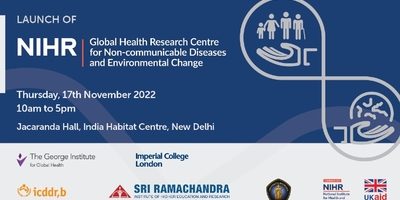
People most impacted must be at heart of climate crisis decisions at COP27 and beyond
As world leaders gather for the 2022 United Nations Climate Change Conference (COP27) in Sharm el-Sheikh, it’s time to centre the voices of communities whose health, wellbeing and futures have been shattered, ensuring they are at the heart of national climate action plans and debate.
Global heating has sparked the worst health and humanitarian catastrophe in history. Communities experiencing marginalisation as a legacy of historic power structures now face the twin threats of rapid environmental change and a fast-growing burden of non-communicable diseases (NCDs), already the biggest killer of people globally. Rates of injury, cardiovascular and acute and chronic kidney diseases, respiratory illness, and mental health conditions are rising along with temperatures.[1][2]
The impact of climate change is supercharged by the unhealthy and unsustainable environments in which people grow, play, live, learn, travel, and work. The global food system, for example, promotes the consumption of diets high in fats, sugars, and salt and low in diversity, fuelling a pandemic of diabetes, cardiovascular diseases, malnutrition and other NCDs.[3][4] It also plays a significant role in environmental degradation and biodiversity loss, through greenhouse gas emissions, unsustainable water extraction and deforestation.
Unregulated burning of plastic waste - often near communities experiencing poverty who have no option to move - releases harmful chemicals such as Dioxin, exacerbating climate change, polluting the environment, and leading to chronic lung disease, heart disease and cancers. Meanwhile, rising sea levels are increasing the salinity of drinking water in some coastal areas, which may be associated with increased blood pressure, progressive kidney disease and gestational hypertension in pregnant women. And these are just a few examples.
The George Institute for Global Health calls on governments at COP27 to commit to:
- Centre the voices of communities most affected by the climate crisis in setting policy agendas and allocating resources for mitigation and adaptation measures, prioritising health equity
- Ensure that the Traditional Knowledges of First Nations and Tribal peoples, and the voices of other communities experiencing marginalisation are heard
- Focus on women, girls and other groups who experience the impacts of the climate crisis disproportionately
- Establish mechanisms to ensure the meaningful participation and inclusion of civil society in climate-related policymaking
- Build effective, equitable and sustainable primary health care systems to reduce and respond to the twin threats of the climate crisis and growing burden of NCDs
- Strengthen the provision of mental health support and other primary health care services to improve psychological resilience and adaptation skills in the wake of environmental damage
- Develop robust digital platforms to monitor and evaluate NCDs and climate threats and generate high-quality data to support decision making
- Reduce the contribution of the health care sector to environmental degradation by researching and implementing low-emission primary health care solutions
- Challenge commercial actors and rapidly transition away from harmful systems, practices, and commodities, including the use of fossil fuels, to secure co-benefits for the health of people and planet
- Adopt regulatory and fiscal measures to facilitate and promote the production and consumption of low-emission, diverse and healthy food options
- Regulate the burning of plastic waste, improve waste management systems, and hold stakeholders to account for collecting and controlling the waste they create
- Identify alternative water sources for coastal communities vulnerable to rising drinking water salinity; for example, through rainwater harvesting and reverse osmosis
You can learn more about The George Institute’s work to accelerate evidence-informed action on planetary health here.
We were recently awarded funding to establish a NIHR Global Health Research Centre for Non-communicable Diseases and Environmental Change, a partnership between The George Institute for Global Health India and Imperial College London.
We are co-leading the COP2 (Care of People x Planet), Southeast Asia and Western Pacific Regional Hub, a growing community of companies, governments, organisations, and institutions focused on strengthening the human operating systems needed to address climate change.
The George Institute is proud to join the call for a global, fossil fuel non-proliferation treaty and is a signatory of the Global Climate & Health Alliance COP27 Health Community Recommendations.
[1]Climate change may be causing chronic kidney disease by triggering dehydration and heat stress (2016) The George Institute for Global Health. Available at: https://www.georgeinstitute.org/media-releases/climate-change-may-be-causing-chronic-kidney-disease-by-triggering-dehydration-and
[2] Why Mental Health is a priority for action on climate change. World Health Organization (2022) Available at: https://www.who.int/news/item/03-06-2022-why-mental-health-is-a-priority-for-action-on-climate-change.
[3] Diet and food systems for Health, Climate and Planet (2021) Health Climate Network. Available at: https://epha.org/wp-content/uploads/2021/07/hcn-briefing-1-diet-and-food-systems-final.pdf.
[4] Centre of Research excellence: Healthy Food, healthy planet, healthy people (2022) The George Institute for Global Health. Available at: https://www.georgeinstitute.org/projects/centre-of-research-excellence-healthy-food-healthy-planet-healthy-people.















